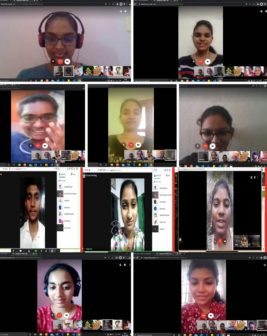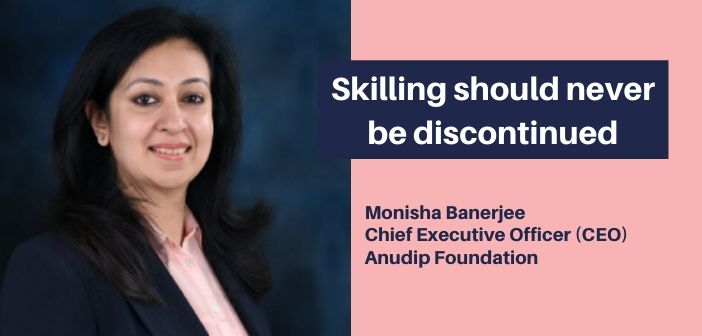“Skilling should never be discontinued” – this has been Anudip Foundation‘s mantra since the outbreak of the COVID-19, which has changed the way we live, learn and leverage our potentials. Almost all Universities, schools and colleges have been grappling to transition to an online mode of education.
Since we are a livelihood provider, our students come from disadvantaged backgrounds, for whom learning itself is a challenge, and therefore adapting to an unconventional mode of learning was even harder. However necessity is the mother of all invention, as they say, and the closing down of educational institutions catapulted us into action. Consequently, Anudip was amongst the early organisations that did not allow for class disruption. There are several learnings associated with this experiment, which is continuously evolving.
Paradigm Shift from Physical to Digital
Since the inception of our DIYA (Digital Inclusion of Young Aspirants) program, we have been following the blended-learning for delivering training to our beneficiaries, which constitutes two major attributes:
Online Learning-Management: which ensures that the student is engaged and drives self-learning experience,  by themselves. The content is digitized and uses multimedia, activities and games, creating an immersive professional development program. While the student is expected to navigate the content by himself, the student comes to the center and is helped by the instructor if there are comprehension issues. Most of the content is visual and hence largely language agnostic. There are interim short interactive elements that test if the student is actually reading and has understood the material before he is allowed to proceed further. The self- learning component is built to drive inquiry-driven learning and make students active learners.
by themselves. The content is digitized and uses multimedia, activities and games, creating an immersive professional development program. While the student is expected to navigate the content by himself, the student comes to the center and is helped by the instructor if there are comprehension issues. Most of the content is visual and hence largely language agnostic. There are interim short interactive elements that test if the student is actually reading and has understood the material before he is allowed to proceed further. The self- learning component is built to drive inquiry-driven learning and make students active learners.
Physical Instructor Led Training: The trainer builds on the content from the LMS and ensures conceptual understanding of the content through application based examples. Practical classes are further done through assignments.
This methodology powers the majority of our courses ranging from regular courses like Certificate in Digital Education, IT fundamentals, to high-end courses like Digital Marketing, Web Designing, Tally ERP, Dot NET, Full stack based programming and others.
 Post the suspension of classes in educational institutions (even before the complete lockdown was announced) the in-person classroom sessions had been replaced with online classes for continuous skilling . Our Product team experimented with several models and have come up with models that are seeing successful outcomes. A few of the key points of learning are as follows:
Post the suspension of classes in educational institutions (even before the complete lockdown was announced) the in-person classroom sessions had been replaced with online classes for continuous skilling . Our Product team experimented with several models and have come up with models that are seeing successful outcomes. A few of the key points of learning are as follows:
Teachers needed Upskilling
Most trainers were used to the classroom style of training and were reluctant or apprehensive about moving to a purely virtual model for skilling. Extensive training was provided about the portals such as Google Hangouts, Skype, and WebEx, how to leverage all features on these portals, record sessions and make the sessions interactive.
Engagement of Students
Teachers felt initially that virtual classes would be an impediment to interactivity and students’ participation. Our Academic team then included tools such as menti.com to take responses from students to questions asked or to discuss responses to certain key learning points. Attendance was captured online as well.
Getting students to attend online
After initial reluctance, students have started attending regularly and have begun to enjoy the classes. The feedback is positive and many say they prefer this mode of learning to the commuting. Intensive counselling sessions were organized by the faculty and local teams to explain the importance of continuity and the importance of being able to adapt to dynamic situations.
Availability of devices
One of the biggest challenges has been the availability of a smart device (computer, laptop, tab or smartphone). In our experience about 50% of our students had these devices though the numbers were slightly higher in urban India.
Access to the Internet: In Covid times, it would not be fair to have students use their phones and data. With the help of several donors, we were able to upgrade internet packs for both students and trainers who were working from home.
So far, 101 batches are being conducted across 16 Indian States virtually. 66% of the classes are being conducted through Google Hangout, 12% through Skype, 13% in Zoom App and 4% through WebEx.
Thanks to smart-phone penetration, students now connect through WhatsApp groups, which has emerged as a coalescing strategy to ensure that the skilling is continuous, to stay connected. Besides, we are conducting Facebook Live Sessions by Leaders from the industry, who are willingly volunteering to speak on current trends and future of work to an enthusiastic audience live on social media.
For Anudip, which has always focused on creating livelihoods based on digital skills, going online and using digital tools as a methodology was the next step. While COVID is steering thought to deal with everything online and virtual, the pandemic has also helped us identify what the most important skills needed today are- namely adaptability, problem solving, and most importantly, life-long learning skills.
Author: Monisha Banerjee, Chief Executive Officer (CEO), Anudip Foundation












